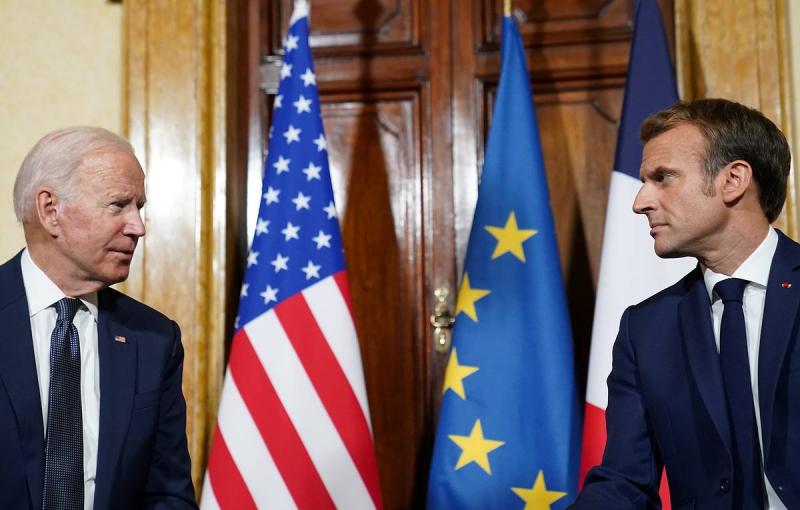
© REUTERS/Kevin Lamarque/TASS
Last week, French President Emmanuel Macron paid a three-day visit to the United States. For American leader Joe Biden, this was the first high-ranking foreign guest over his entire presidency. Perhaps this is why the US president was so polite and compliant in negotiations with his French counterpart, as he even could not let go of his hand when shaking it at the meeting.
As US Coordinator for Strategic Communications at the National Security Council John Kirby explained, the President of France was not chosen by chance for the first state visit and such a VIP treatment. US foreign policy relies upon the strength of alliances, and France is America's oldest ally. However, as highlighted by Western media, the Americans also need to try and appease France as the most obstinate ally advocating greater independence for Europe. During Macron's first state visit to the United States in 2018 under then President Donald Trump, Washington had failed to get the Frenchman on the right track.
This time, Emmanuel Macron delivered a bombshell, saying that France is interested in restoring strategic dialogue and a common agenda with the United States. He also noted that America’s protectionist plans to subsidize its companies "threaten to split the West."
It's no secret that the United States is having a tough time with its European partners. Moreover, there has been talk about a possible trade war between America and the Old World. In this regard, EU colleagues put high hopes on President Macron's visit, primarily as regards solving disputed economic problems between Washington and Brussels. In a way, Macron did manage to prevent the trade war, at least for a while.
According to Politico, "the key breakthrough for Macron would be some kind of concession that European allies could be win the same rights in the IRA subsidy deals as American, Canadian and Mexican companies." Europe is dissatisfied with Biden’s $369 billion Inflation Reduction Act for the "green" industry, which may entail investment drain from the EU to the United States. The Europeans fear that their companies will massively move overseas.
In this regard, Macron's visit to the States has been deemed as a last-ditch attempt to reach a truce with Washington before the EU and the US enter into a subsidy race or a full-scale trade war with compensatory tariffs. Europe insists on getting the same rights as the Mexicans or Canadians in order to benefit from America’s green money supply. At the final press conference with Macron on December 1, Joe Biden said he made some concessions on IRA, although its repeal is out of question, which he unambiguously stated, Politico claims.
"But there are occasions when you write a massive piece of legislation, there’s obviously going to be glitches in it, and the need to reconcile changes. My point is we’re back in business and we’re going to continue to create manufacturing jobs but not at the expense of Europe," Biden said.
If we closely follow the course of Emmanuel Macron's visit to the White House, we’ll see that the two presidents were doing their best to demonstrate friendship and unity, France 2 TV channel reports. Nevertheless, there is still discontent between them, particularly as related to US protectionist measures Macron considers unfair for European companies. Many pundits agree with this opinion and believe the French leader’s visit was more of PR than specific agreements. Thus, its outcome can be hardly called successful, at least to the Europeans.
Here we should not ignore such an important issue as the Ukraine crisis, on which Joe Biden and Emmanuel Macron showed enviable unanimity when speaking at the final press conference. A statement to that effect has come from The New York Times, for one. The parties met each other halfway: the American president declared openness to negotiations with his Russian counterpart Vladimir Putin, but only if the latter pledges to stop the fighting in Ukraine. Which is not the case as yet, Biden said, noting that he has no plans to get in touch with President Putin in the near future, with negotiations being only possible after NATO consultations. Demonstrating transatlantic unity is especially vital in the run up to the cold season, with new energy sources needed in the face of rising prices, the outlet adds.
In turn, the French leader said he was ready to boost military support for Ukraine, and promised further talks with President Putin in an attempt to prevent escalation and achieve specific results like NPP safety. At the same time, the West would not urge Ukrainians to compromise on any unacceptable terms, the French president noted.
Biden and Macron stressed they would demand that Russia take responsibility for its actions in Ukraine, Reuters writes. Moscow, in turn, accused Washington and NATO of playing a direct part in the conflict and turning Ukraine into an existential threat to Russia it cannot ignore. Nevertheless, there are still some communication channels left: on December 1, Kiev and Moscow confirmed another prisoner exchange, the agency notes.
Well, as President Macron's visit to the United States and his talks with Joe Biden have shown, the Western stance on Ukraine remains the same: it will keep shoveling Kiev with weaponry. In this regard, Russia cannot recreate, as it only needs victory in this battle. An overwhelming and flawless one…









